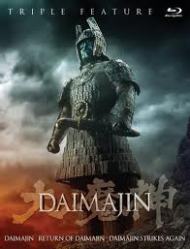Nothing brings the glow of good will, candy canes, and mistletoe to a geek’s heart more than the annual Christmas appearance of Doctor Who. Since his return in 2005, no holiday season has lacked a visit by the Time Lord: some dark, some light. I could explain who The Doctor is, the history of the show, etc. etc., but there is no point. If you can’t recite the history of the last Gallifreyan, go rent the regular season episodes. If you, like me, bleed geek, you already know anything I could say, so on to evaluation: A count down of the Christmas episodes. Most are excellent and all are at least worth the time to watch.
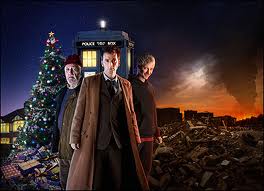 #9 The End of Time (2009)
#9 The End of Time (2009)
The Doctor faces the end of time as The Master returns, unknowingly fulfilling the plans of a much greater power.
The End of Time is a vast epic that never fulfills its potential. At times it plods along, at others it leaps forward, always unevenly. Concepts that should have been the central element of their own episode (the duplicating of The Master) only divert from the main story and end up being irrelevant. Serious elements turn out to be silly. Jokes turn out to be silly. Special effects look silly. “Silly” is the word of the day.
Timothy Dalton was an inspired choice as the leader of the Time Lords, but he brings nothing to the table except his commanding voice as he chews the scenery like a first year theater major. The end, both of the story, and of Tennant, is satisfying, which makes this worthwhile, even if it is a slog to get through.
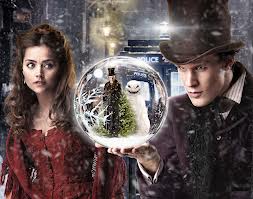 #8 The Snowmen (2012)
#8 The Snowmen (2012)
In 1892 London, Snow is taking on a life of its own, and threatening the existence of mankind. Strangely clever Clara seeks the help of a reluctant Doctor and his band of colorful colleagues.
The third Xmas outing for the eleventh Doctor is the most uneven. There is little story to speak of and what is there doesn’t deserve to be spoken of. Plot slips away as symbolic elements become nonsensically literal. Matt Smith fails to carry the emotional load he shouldn’t have been given. But while the most vital elements of storytelling collapse, lesser ones shine. The new companion, Clara (Jenna-Louise Coleman) is witty, complex, strong, and exactly what the show needed, taking away the sting of Amy’s departure. She comes wrapped in a puzzle that should keep Whovians arguing for months (till the next episode airs). The secondary characters include the sword wielding detective, and lizard, Vastra, and her assistant and wife Jenny, along with a worse-for-ware alien soldier/nurse who supplies the comedy. They outshine The Doctor every second they are on screen, and scream out for their own show, as well as making The Snowmen worth the time of Who fans, though not the general public.
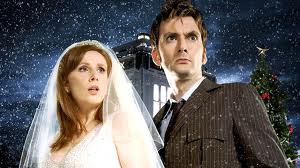 #7 The Runaway Bride (2006)
#7 The Runaway Bride (2006)
The Doctor stumbles upon a bride and an ancient evil that plans to use her to return.
Donna Noble appears as the first companion-for-a-single-special, only to pop back a year later to become a full time companion. Her shtick was pretty much the same from show to show, but it’s new here. David Tennant and Catherine Tate are at their comical best with a constant stream of bickering, which is made even better by the killer, robot, Santa Clauses from The Christmas Invasion. It’s all good holiday fun, but also juvenile, harkening back to the 1960 children’s show origins of Doctor Who. Don’t use this one to prove that Doctor Who isn’t just for kids.
Compared to later specials, it has surprisingly weak cinematography but budget will show.
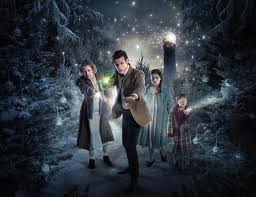 #6 The Doctor, The Widow, and the Wardrobe (2011)
#6 The Doctor, The Widow, and the Wardrobe (2011)
The Doctor’s attempt to repay a debt goes wrong, and it is up to a recent widow to pass through a dimensional gateway to rescue her children and The Doctor from a forest of living Christmas trees and acid rain.
As the title suggests, there is a lot of C.S. Lewis to be found in this outing (WWII setting, children sent to the country to avoid the bombings, a gateway into a snowy world), but it is only window dressing. The actual story has nothing to do with Narnia, and very little to do with…story. This is the slightest of all the Christmas specials, with almost nothing happening, and no conflict. Outside of setting up the doorway, even the doctor barely acts. Call it a little story with a lot of emotion. But little stories can be enjoyable, and this one is.
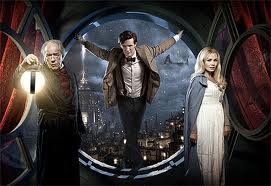 #5 A Christmas Carol (2010)
#5 A Christmas Carol (2010)
On a distant world, The Doctor goes pseudo-Dickens in an attempt to persuade a curmudgeon to use his weather machine to save a plummeting space craft.
The eleventh Doctor’s first Christmas special is warm, emotional, funny, and a lot less Dickensian than the title would suggest. Why show someone the past, present, and future to change them, when you can instead go back in time and actually change him? The romance feels real and heartbreaking, the cinematography is first rate, and the music is beautiful.
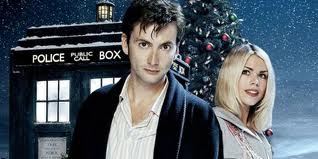 #4 The Christmas Invasion (2005)
#4 The Christmas Invasion (2005)
Rose returns to Earth with a comatose Doctor, not yet recovered from his regeneration into Doctor Ten. Unfortunately, malevolent aliens can feel his energy, and choose this as the perfect time to attack Earth.
I’ve a full review of this one, but in short it has Rose, Harriet Jones, killer Santas, weaponized Christmas Trees, and one of the best regeneration recoveries in Doctor Who’s 50 year history. Its flaw: Too little Doctor. Tennant’s Doctor is nearly perfect; too bad he sleeps for half the running time.
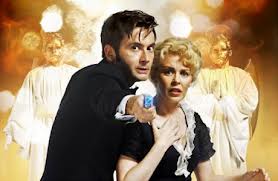 #3 Voyage of the Damned (2007)
#3 Voyage of the Damned (2007)
The Doctor joins the party on a space-faring luxury liner (named Titanic, and yes, The Doctor notices that) headed to primitive (2007) Earth. Purposely dropped shields and a trio of flaming space rocks spell disaster for the ship. Now if The Doctor and waitress Astrid Perth can just stop the Earth from blowing up when the vessel crashes.
Ah, what might have been. Kylie Minogue’s Astrid would have made an excellent full season companion, but as we only got her for this episode, its nice to know we can go back and watch it over and over.
The story is pure Poseidon Adventure, with the requisite heartrending deaths and uplifting survivals. It is surprising how much I felt each one. The concept is so-so, but the execution elevates it. And you have to love The Host. The universe needs more homicidal angels.
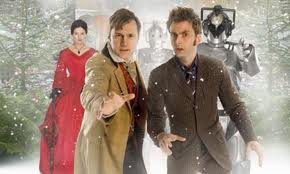 #2 The Next Doctor (2008)
#2 The Next Doctor (2008)
The Doctor returns to the late 1800s for another Christmas, and is surprised to find a Time Lord named The Doctor already there. This Doctor has no memory of his past, so Doctor number ten decides to help with a mystery involving murders, missing children, and cybermen.
Two Doctors for the price of one, and both funny and able to twist your heart. Good story, tension and humor, geektastic moments (images of the entire line of Doctors are projected on a wall), a first rate villain in Miss Hartigan, and a steampunk giant, The Next Doctor has it all. It is also the most cinematic of all the specials (and of all the episodes), with some beautiful shots (Hartigan’s red dress seen through falling snow in a black and white world). This is the best of the specials, and would be the best Doctor Who Christmas except…
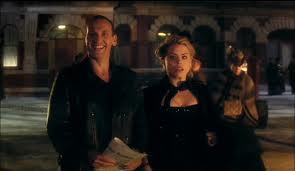 #1 The Unquiet Dead (2005)
#1 The Unquiet Dead (2005)
The Doctor miscalculates, taking new companion Rose to Cardiff for Christmas where a depressed Charles Dickens is performing a public reading. When an animated corpse disrupts the event, The Doctor teams up with Dickens to get to the heart of a real ghost story.
Not a special, but the 3rd regular episode of the “new” Doctor. Everything was fresh. Christopher Eccleston was mysterious and dangerous. Billie Piper was charming and sexy. They are tossed into a world that is frightening and exhilarating. Every character has a moment to shine, a moment to learn, and several moments to fail. The Unquiet Dead is not only the best Christmas episode, but the best of the “…..meets a historical figure” episodes, and one of the top episodes period. Merry Christmas.

